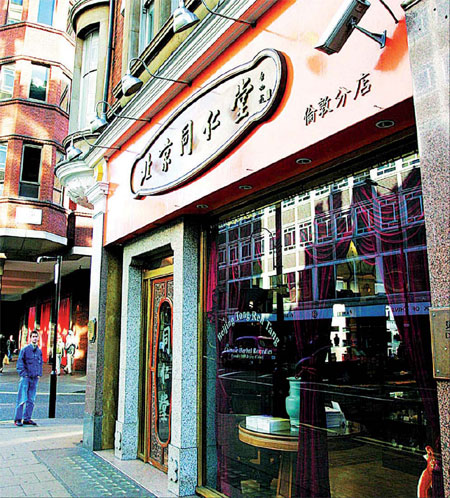A bright light in the euro gloom
Updated: 2013-09-27 09:42
By Fu Jing (China Daily)
|
|||||||||||
Although Europe's economy is struggling, Chinese investments there are doing just fine
Crisis and opportunity often run in tandem. A new report shows that Chinese investments in Europe grew dramatically in 2011-12, despite the continent continuing to suffer a downturn in that period.
While Europe suffered because of the sovereign debt crisis, China's economic activities there produced about 100,000 new jobs.
This is the key finding in the latest biennial Euro-China Investment Report compiled by a research team at the Antwerp Management School in Belgium.
The team found that by January 2013, the number of Chinese companies in Europe increased to 7,148, with a total of 123,780 employees. In January 2011, the number of Chinese companies on the continent was 4,525, with a workforce of only 27,381.
"We found that China's investment in Europe underwent surges in nearly every area of analysis during 2011-12," says professor Zhang Haiyan, head of the research team and academic director of the Euro-China Research Center at the University of Antwerp, which includes the management school.
"And China's story of investment in Europe is still unfolding."
Zhang's team has been closely monitoring China's investment activities in Europe, especially since the beginning of this century, when the Chinese government started encouraging its investors to go global.
China's overseas economic activities gathered pace after the 2008-09 global financial crisis. Prompted by that trend, Zhang's team published the first China-Europe Investment Report in November 2011.
"Compared with the first report, we have drawn some very striking conclusions," says Zhang, who provided the report exclusively to China Daily before its official launch.
In addition to the rapid increase in company numbers and employment, Zhang says the assets of Chinese-invested companies have also increased significantly. The first report estimated the assets of Chinese companies at about 15 billion euros ($20.3 billion). By the end of January this year, Chinese investors in Europe had assets worth about 88 billion euros.
Zhang says his team's research was based on information from the Amadeus European Company Database, which contains comprehensive financial and business data on more than 19 million companies registered in 43 European countries.
Due to the likely incompleteness of information on Chinese investors in the database, Zhang says Chinese business activity in Europe is probably even larger than that described in his new report.
In spite of this rapid growth, only just more than half of Chinese-owned firms in Europe generated profits, while almost as many (47 percent) registered losses in the latest available financial year, according to the report. The proportion of profitable firms is slightly higher for subsidiaries set up by state-owned enterprises and privately owned industrial groups than for individual and family businesses.
This is in contrast to the fact that more than 80 percent of European businesses in China are profitable.
In the 2011 report, about 75 percent of Europe-based Chinese firms recorded a profit, and this substantial decline in returns on investments was most likely linked to the worsening economic situation in Europe, Zhang says.
Zhang says Chinese companies have intensified their cross-border M&A activities in Europe, especially targeting knowledge-intensive and high-tech manufacturing and services companies in Western and Northern Europe.
"These asset-augmenting investments were not only carried out by Chinese SOEs, but also by privately owned Chinese firms, which are becoming increasingly engaged in cross-border M&As," says Zhang.
According to Amadeus' ownership database, the 7,148 Chinese direct-investment enterprises registered in 35 European countries have 14,707 shareholders or investors. And 85 percent of these were identified as individual or family investors, while the rest are corporate investors, including industrial companies (12 percent) and institutions (2 percent).
The comparative analysis of the knowledge intensity and technical level of Chinese-owned firms in the two reports shows that over the past two years, the proportion of companies in less knowledge-intensive services has dropped slightly, while low-tech manufacturing companies recorded strong growth of 26 percent. Knowledge-intensive service companies grew by 13 percent and high-tech manufacturers by 6 percent.
Zhang says the substantial increase in the number of Chinese investors in low-tech manufacturing activities is related to the recent surge of Chinese manufacturing firms setting up in Central and Eastern Europe.
According to Zhang, the number of firms with Chinese direct investments in Southern and Western Europe has increased, while their importance in Eastern and Northern Europe was reduced.
Yet, the number of jobs in the north and south has increased significantly.
The report found that Romania, France, the Netherlands, the Czech Republic and Switzerland hosted a substantial number of Chinese firms and registered significant growth over the past two years.
In the same period, Russia, Hungary, Bulgaria, Britain and Germany attracted Chinese investment, but recorded a drop in the number of Chinese firms doing business there.
Zhang says that due to declining export markets, increased competition, rising labor costs and overcapacity, Chinese manufacturing companies have started to invest in lower-cost Central and Eastern Europe, where they can also avoid tariff barriers and anti-dumping measures.
The European Commission has targeted China in its trade defense investigations. "This will help boost Chinese investment in Europe as a way to avoid tariff barriers," Zhang says.
Due to the growing income of China's middle class and mounting concerns about product quality and safety, Chinese companies sped up their M&A activities in Europe, acquiring well-known brands in consumer goods - especially in food and clothing - and leisure services to sell in their domestic market, Zhang says.
According to Zhang, these trends also reflect China's recent reform strategy to emphasize domestic consumption.
Besides a surge in M&As by SOEs in Europe, Zhang says, Chinese sovereign wealth funds have increasingly invested in public utilities and infrastructure in Europe as a way to diversify their foreign reserves and to build a more balanced asset portfolio.
Zhang also noticed that more Chinese individuals and family businesses have continued to invest in Eastern and Southern Europe.
"Following the special efforts by some less advanced European countries to attract Chinese investment, more Chinese individual and family investors can now be considered international entrepreneurs," Zhang says.
Although China's capacity to invest overseas is generally estimated to be very high, until now it has only provided a small segment of the EU-27's incoming foreign direct investment. China's share of the European Union's foreign direct investment from non-EU countries amounted to less than 0.4 percent in 2011.
"This extremely low percentage should certainly assuage the fears expressed by some politicians and media about the spreading influence of China on European markets and industries," the report says.
Given that China has changed from being largely a receiver of FDI to a provider, Zhang says the Chinese government has become more active in initiating or adapting its trade and investment agreements, especially with its developed partner countries. Examples include the negotiations over the China-EU investment agreement and the US-China free trade agreement. Chinese companies have also started to use the international legal framework to protect their interests abroad.
But Zhang says the rapid increase in China's direct investment in Europe, especially the acquisition of European high-tech companies, public utilities and infrastructure projects by SOEs, has caused Europeans to see Chinese investors as somewhat different from their US and Japanese predecessors.
"For the first time, an emerging country has rapidly become a substantial source of FDI in an upstream economy, mainly to acquire instead of transfer assets," Zhang says.
"A better understanding of these unconventional investors is important not only for the European Union to update and implement its existing policies and regulations, but also for local business communities to maximize the benefits from Chinese investment."
fujing@chinadaily.com.cn
|
The London shop of Tongrentang Group, a traditional Chinese medicine giant. Provided to China Daily |
( China Daily European Weekly 09/27/2013 page20)
Today's Top News
Website launched to assist expat professionals
50 foreign experts honored with Friendship Awards
Up, up, Huawei finds new friends in Europe nations
Visible face of CIC investment
Shanghai opens free trade zone
Academic warns Obama on Pacific policy
Little-known now, but a big future
NSA mapping social networks of US citizens
Hot Topics
Lunar probe , China growth forecasts, Emission rules get tougher, China seen through 'colored lens', International board,
Editor's Picks

|

|

|

|

|

|






